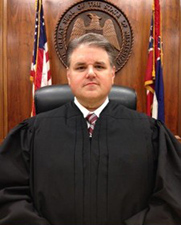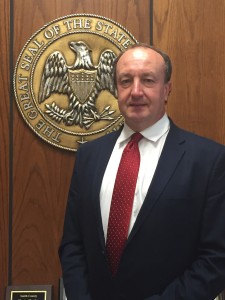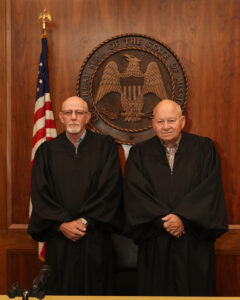Chancery Court

Honorable David Shoemake
Chancery Judge Post 1
P.O. Box 1678
Collins, MS 39428
601-765-8284 office
601-765-8282 fax
Honorable Gerald Martin
Chancery Judge Post 2
P.O. Box 325
Raleigh, MS 39153
601-587-2997 office
601-587-2999 fax
Chancery Court Cases Include:
- Domestic and family matters: divorce, child custody, property division, adoptions, alimony
- Estates of descendants
- Land issues (titles, contracts)
- Commitments of mentally disabled
- Equity appeals from County Court
Responsibilities of the Chancery Court
The Chancery Court has always been the separate court of equity (as distinguished from the law court circuit) in Mississippi, and the Chancellor generally hears cases without a jury. Juries are permitted only in paternity cases and will contests. An advisory jury is permitted in any case, but as the jury’s decision is advisory only and not binding on the Chancellor, this use of a jury seems of little or no use. Advisory juries are rarely utilized but all litigants have the right to request the same.
The Chancery Court handles equity cases involving domestic and family matters such as divorce, child custody and support, property division, adoptions, and all related issues. Additionally, the Chancery Court handles and processes the estates of decedents (with or without a Last Will and Testament) and all issues involving minors. This court handles a wide variety of other matters, including issues concerning title to land, contracts, injunctive matters, and commitments of persons impaired through mental disability and/or chemical-substance-alcohol abuse.
In the 63 counties having no Family or County Court, the Chancery Court either hears all youth court proceedings or appoints a Youth Court Referee (Judge) to do so. The Chancery Court is a court of record and its appeals are to the Mississippi Supreme Court.
Circuit Court
 Matthew Sullivan
Matthew Sullivan
13th Circuit Court District Judge
PO Box 545
Raleigh, MS 39153
601-782-4413
 Stan Sorey
Stan Sorey
13th Circuit Court District Judge
PO Box 545
Raleigh, MS 39153
601-782-4413
Circuit Court cases Include:
- Civil actions over $75,000
- Misdemeanors
- Bastardy, felonies
- Civil action and criminal appeals from County Court
Mississippi has 22 Circuit Court Districts with 49 judges presiding therein. Districts, created by the legislature and/or the federal courts, vary considerably as to size, population, and configuration. The Circuit Court tries felony criminal cases (as well as misdemeanors on appeal) and civil actions involving issues of $2,500 and above. Appeals from the Circuit Courts are to the Mississippi Supreme Court.
Juries are widely used in the Circuit Court, with a unanimous vote of 12 required for a criminal conviction, but only 9 of 12 required for a decision in a civil proceeding. The Circuit Court with all its attendant costs is generally the most expensive court in a county, but its work is too important to be compromised or sacrificed, and its work must be supported at an efficient and operable level. While it is valuable to continually study the courts and seek improvement therein, it is noted that the alternative to no courts is not acceptable in a civilized society.
Prosecuting Attorney
 Wendell James
Wendell James
Phone: 601-764-7460
The Prosecuting Attorney is responsible for prosecuting cases that occur within the county but outside any incorporated areas.
Represents the State in the Justice and County Courts involving the following types of cases:
- Felony investigations and preliminary hearings
- County court criminal cases and those appealed to the circuit court
- Misdemeanors
In cooperation/assistance with the district attorney:
- Criminal and civil cases in which the state, county or any municipality within the county has interest
- Misdemeanors, youth court proceedings and other cases not specifically granted to DA
- Appear on behalf of the DA if designated to do so
District Attorney
 Chris Hennis
Chris Hennis
District Attorney 13th Judicial District
Phone: 601-847-1342
The District Attorney is responsible for:
- The prosecution of all felonies committed within Smith County. Felonies are crimes punishable by imprisonment for a period of more than one (1) year.
- He is the foremost representative of the executive branch of government in the enforcement of the criminal law in his district.
- Cases on the trial docket can range from shoplifting to capital murder.
Duties and Responsibilities:
- It shall be the duty of the district attorney to represent the state in all matters coming before the grand juries of the counties within his district and to appear in the circuit courts and prosecute for the state in his district all criminal prosecutions and all civil cases in which the state or any county within his district may be interested; but if two (2) or more counties are adversely interested, the district attorney shall not represent either. Any district attorney may also institute and prosecute to final judgment or decree any case in the name of the state against any person or corporation for any violation of the constitution or the laws of this state, in order to enforce any penalties, fines, or forfeitures imposed by law in any court of his district having jurisdiction, with like effect as if the suit was instituted by the attorney general.
- The district attorney may transfer any case handled by him to a county prosecuting attorney when charges in such case no longer constitute a felony.
- The validity of any judgment or sentence shall not be affected by the division of jurisdiction under this section, and no judgment or sentence may be reversed or modified upon the basis that the case was not processed according to this section.
- A county prosecuting attorney or municipal prosecuting attorney may be designated by the district attorney to appear on behalf of the district attorney pursuant to an agreement relating to appearances in certain courts or proceedings in the county of the county prosecuting attorney or in the municipality of the municipal prosecuting attorney. Such agreement shall be filed with the circuit court clerk of any county where such agreement shall be operative. Such agreement shall be binding upon the district attorney and county prosecuting attorney or municipal prosecuting attorney until dissolved by either of them in writing upon five (5) days’ notice.
- Where any statute of this state confers a jurisdiction, responsibility, duty, privilege or power upon a county attorney or county prosecuting attorney, either solely, jointly or alternatively with a district attorney, such county prosecuting attorney shall be responsible for the prosecution, handling, appearance, disposition or other duty conferred by such statute. Any such provision shall not be construed to bestow such responsibility, jurisdiction or power upon the district attorney where there is no elected county prosecuting attorney, and any such matter shall be handled pursuant to Section 19-3-49, Mississippi Code of 1972.
- The district attorney or his designated assistant, or the county prosecuting attorney or his designated assistant, shall assist the attorney general in appeals from his district to the Mississippi Supreme Court and in other post-judgment proceedings and shall appear for oral argument before the supreme court when directed by the supreme court.
- The several district attorneys shall submit reports of revenues and expenditures and shall submit budget requests as required for state general fund agencies. For purposes of budget control, the several offices of the district attorney shall be considered general fund agencies, and the budget and accounts of the several offices, including salaries, travel expenses, office expenses, and any other expenditures or revenues, shall be consolidated for all districts as far as such consolidation is practical. All revenue or funds allocated or expended by a district attorney, whether such funds are appropriated from state funds, or whether such funds are received from county funds, grants, or otherwise, shall be reported to the legislative budget office.
Justice Court

Justice Court Judges
Justice Court Judges are elected officials serving 4-year terms. To qualify to serve as a Justice Judge the candidate must meet the following requirements:
- High school diploma is mandated
- Justice Court Training Course provided by the Mississippi Judicial College of the University of Mississippi Law Center
- Annual continuing education requirements prescribed by the Judicial College
- Resident of County at least 2 years prior to serving it
- Hold at least one session of court per month, but not more than two.
Responsibilities of the Justice Court:
Smith County Justice Court has jurisdiction over all actions for the recovery of debts or damages as well as personal property, up to $2,500. Clients file affidavits in Justice Court to recover property to settle debts, or to seek relief from disputes over family matters or issues involving neighbors and others.

Additionally, Justice Court handles fines resulting from citations by the Mississippi Highway Patrol and Fish and Wildlife Department officers. It holds court for citizens who protest such citations. It also holds court to settle criminal violations occurring outside the municipalities but within the county and performs marriage ceremonies. It issues process papers, subpoenas, and warrants requiring an appearance in court on a specified date.
Justice Court works cooperatively with the Public Service Commissioner and received monies resulting from periodic vehicle inspection roadblocks.
The officers of the court consist of a Justice Court Clerk, or Court Administrator, 12 deputy clerks, a bailiff, and four judges. Process papers, subpoenas, and warrants are served by Constables who are elected officials.
A 1984 statute by the Mississippi Legislature requiring a competent number of justice court judges in each county eliminated the Justice of the Peace System and established the present Justice Court System.
